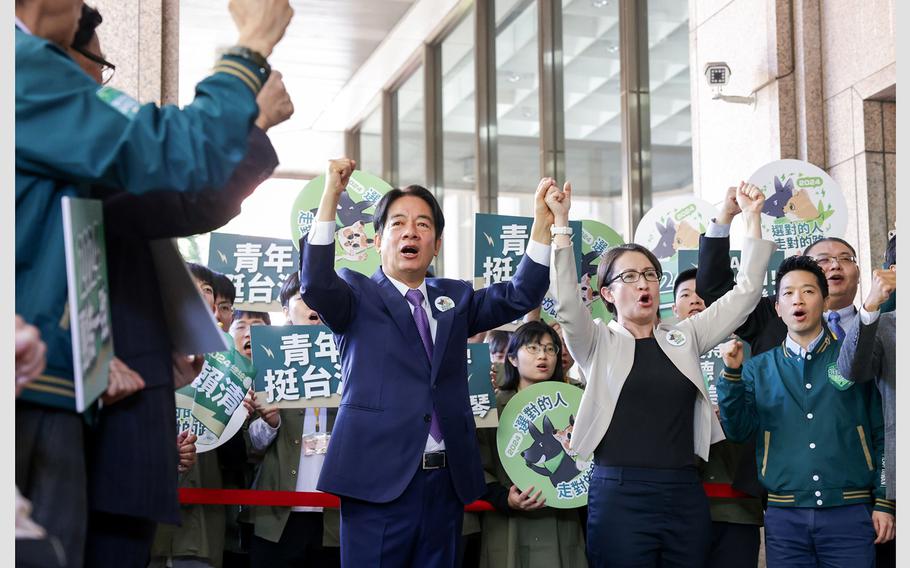Asia-Pacific
Taiwan loses another diplomatic ally as Nauru recognizes China
The Washington Post January 15, 2024

Lai Ching-te and running mate Hsiao Bi-khim in Taipei on Nov. 21, 2023. (I-Hwa Cheng/Bloomberg)
TAIPEI, Taiwan — The Pacific island nation of Nauru announced on Monday it was severing diplomatic ties with Taiwan and instead recognizing China.
The surprise switch shaved Taiwan’s diplomatic allies down to fewer than a dozen nations. In a statement posted online, Nauru’s government said the move was “in the best interests” of the country.
“This means that the Republic of Nauru will no longer recognize the Republic of China (Taiwan) as a separate country but rather as an inalienable part of China’s territory, and will sever ‘diplomatic relations’ with Taiwan as of this day and no longer develop any official relations or official exchanges with Taiwan,” it said in a statement that echoed standard Chinese descriptions.
The announcement came just two days after a historic election delivered Taiwan’s ruling Democratic Progressive Party an unprecedented third term in office, despite Beijing’s efforts to sway the vote in favor of the more China-friendly party.
“This timing is not only China’s retaliation against our democratic elections but also a direct challenge to the international order,” Taiwan’s Foreign Ministry said in a statement posted online. “Taiwan stands unbowed & will continue as a force for good.”
The Chinese Communist Party, which has never ruled Taiwan, claims the island democracy as part of its territory, and leader Xi Jinping insists unification is “inevitable.”
The announcement by Nauru marks another win for Beijing in its global pressure campaign to poach the remaining countries that recognize Taiwan. Beijing praised Nauru’s decision on Monday afternoon.
Nauru, an island of just 8 square miles — many scarred by shuttered phosphate mines — and 12,000 people roughly halfway between Australia and Hawaii, has few sources of revenue.
The move is the third such flip among small Pacific nations in less than five years after the Solomon Islands and Kiribati switched to recognizing Beijing in 2019.
Now only 11 countries — including Belize, Paraguay and Eswatini — and the Holy See officially recognize Taiwan as China has systematically picked off nations that continued to recognize Taipei.
“China is suppressing us and using money diplomacy in every possible way,” Tien Chung-kwang, Taiwan’s deputy foreign minister, said at a news conference Monday.
“No matter what the election result is, China is always trying to suffocate Taiwan in any international arena,” Tien said. Nauru had asked for a “huge amount” of economic assistance from Taiwan in recent years, he said.
Taiwan’s Foreign Ministry received notice of Nauru’s plans to cut ties just before noon on Monday, he said.
Nauru previously dropped Taipei for Beijing from 2002 to 2005. Taiwanese officials said at the time that China had offered Nauru millions of dollars in aid and that Taipei had not been willing to engage in a bidding war to match it.
The tiny country seemed to stand firm against Beijing’s growing influence when a diplomatic spat at the 2018 Pacific Islands Forum over what then-president Baron Waqa called “bullying behavior” led him to decry the Chinese delegate as “a nobody.”
But Waqa was voted out a year later, and the current president, David Adeang, informed islanders of the switch in a short video posted to Facebook on Monday.
The timing of the announcement, on the heels of Taiwan’s election, is not a coincidence and demonstrates China’s efforts to dismantle Taipei’s network of allies in the Pacific, said Anna Powles, a Pacific expert at New Zealand’s Massey University.
“For so long, the Pacific was the bulkhead of Taiwan’s allies, and they have been successively whittled down over the years by China,” Powles said. Canberra and Washington’s ability to influence Pacific nations’ ties with China has been “demonstrably low,” she said.
In Taipei, Nauru’s decision has been taken as an indicator of Beijing’s displeasure with the choice of Lai Ching-te, whom it views as an agitator for independence, as the next president. The move also demonstrates China’s ambitions to shape the broader region, said Chung Chih-tung, a scholar at the Institute for National Defense and Security Research in Taiwan.
“In addition to warning Taiwan on the one hand, this importantly shows China’s ambitions to plant its flag in the South Pacific,” Chung said. “And this will also put considerable pressure on countries like the United States and Australia.”
James Batley, who served as Australia’s top diplomat to Nauru from 2007 to 2009, said the switch would bolster Xi’s claim that Beijing is bound to rule Taiwan.
“It entrenches this idea that this is the trend of history,” said Batley, a fellow at Australian National University. “Clearly China is working hard on every single country that recognizes Taiwan, and it’s had a win.”
Miller reported from Canberra, Australia. Pei-Lin Wu contributed to this report.